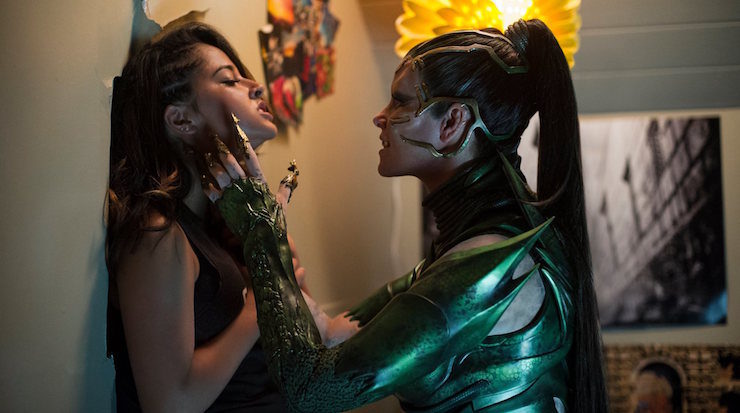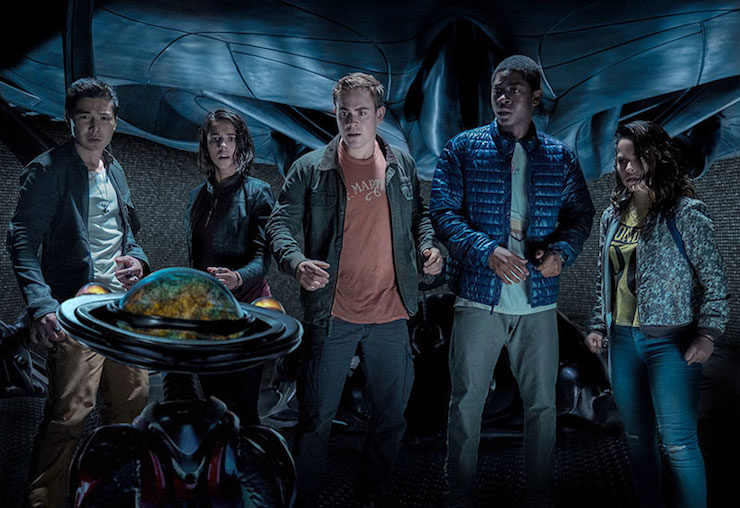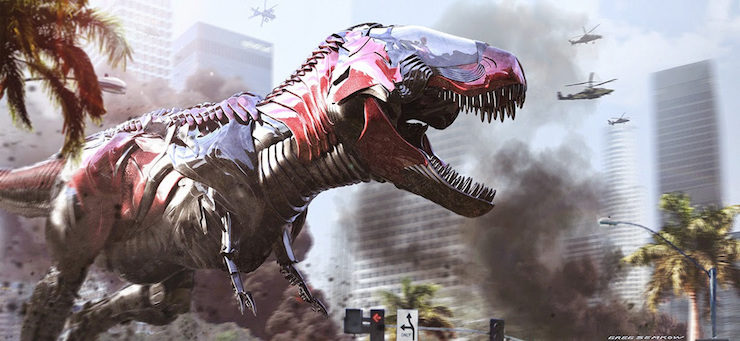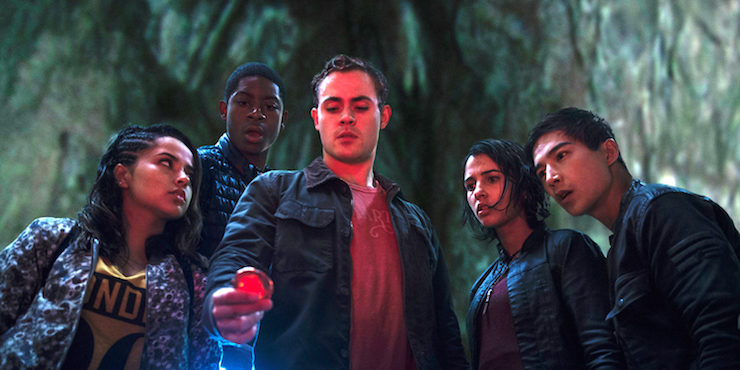If you watched the Mighty Morphin’ Power Rangers in the 90s (*raises hand*) you were aware that the show was nothing but a formula: five teens hang out at dojo, teens have personal problem, Rita wants to wipe them out because she’s the villain, she creates putties to give them a lukewarm fight, Alpha says “Ai-yi-yi” because he’s a funny robot, Zordon gives advice and/or pep talk, Finster makes Rita a monster, Power Rangers morph, get in dino-bots called zords to fight monster, are forced to form mega-bot to stop it, kill monster in one broadsword stroke, Rita is angry and vows revenge. The end.
How did you turn that barely conceived paint by numbers premise into a good movie? How? she screams into the proverbial void, knowing that none can answer this age-old (i.e. about twenty year) riddle.
Then I saw Power Rangers. And somehow, I want to watch it again.
There was plenty of excellent entertainment around when I was growing up, lots of strange television to expand my mind with. (The 90s was the first golden era of Nickelodeon, and we learned a lot from Doug, the Rugrats, Clarissa, et all.) Most kids you talked to knew Power Rangers wasn’t what you’d call high-quality storytelling; the American version cribbed all its recycled bits–Rita and dino zords included–from the original Japanese incarnation titled Super Sentai, and never varied a single shot. The Rangers themselves were a cringeworthy casting exercise where the Black and Yellow Rangers were inhabited by the team’s black and Asian members, respectively. The acting was overall abysmal, the emotions elementary at best. And for a show that held up its heroes as the greatest of the great, they did their fair share of petty bullying—against other bullies, so it was supposed to be okay in the long run?
But there was something about the show that captured our imaginations. We’d pretend to be Power Rangers on the playground, questionable karate moves and all. Everyone had their favorite; mine was Billy the Blue Ranger. Surprise, he was nerdy one. (He was also the only one played by a gay actor, which child-me seemed to recognize down in my bones.) It was always deeply irritating when my friends and I hung out with the boys and they demanded that we be the girl rangers, so we’d ignore them play the whole crew without them. All-girl Power Rangers, but playing at the same character relationships (and romances) that the girl-boy version did. Damn, we had fun.

It seems as though the group responsible for this script thought long and hard about what could fill out a film about five teens in costumes battling a mega monster in big robots, and they hit upon the only worthwhile rejoinder; it has to be about five kids forming friendships and becoming a team. The entire movie is precisely about that, and while many have noted that it has quite a bit in common with The Breakfast Club (the whole plot gets a shot in the arm after Dacre Montgomery’s Jason Scott is dropped in detention every weekend for an extremely negligent prank gone wrong), the five kids we have here are more eager to connect with one another, and take to becoming a super team with a gusto that you might wish the Avengers or the Justice League would show a bit more often.
What’s better is that the desire to be truly inclusive in this film results in a team of superheroes the likes of which have never been seen on screen. When Billy Cranston (the soon-to-be Blue Ranger, played by the endearing RJ Cyler) first gets Jason to hang out with him at the nearby goldmine in exchange for deactivating his police tracking anklet, he explains that he’s autistic. That’s right, he doesn’t skirt the issue, doesn’t “let the performance speak for itself” the way most films and shows do—he comes right out and says “I’m on the spectrum.” Then he spends the rest of the film being the heart and soul of the group. No questions, no big deal. That’s who he is, and he’s loved for it. Ludi Lin’s Zack Taylor is the daredevil of the crew, and there’s thankfully not an Asian stereotype in sight where his character is concerned; he’s a sharp spitfire of a guy, and excellent at getting the rest of his teammates into trouble. He’s also poor, and the only one of the group not currently going to school. He loves his mother and she beats him at chess.
And then there’s Trini, the Yellow Ranger—played by Becky G.—who, around a campfire confessional after a really crappy training day with Zordon, is outed by Zack when he rightly guesses that part of the reason her family has been moving her around so often is not boyfriend trouble, but girlfriend trouble. Bam. Queer superhero. No fuss over it. Because this is the world we live in, and we should expect to see ourselves reflected in it and treated with kindness and respect. And Power Rangers just said “okay!” and made it happen because why the hell not?

So many folks were only planning on going to see this film for the sake of watching Bryan Cranston and Bill Hader play the disembodied head and neurotic robot of the movie. Some others were only planning to go and watch Elizabeth Banks chew scenery as the film’s shrieking villain. How exciting to find that while all three of them execute their parts with the aplomb you’d expect, they are far from the helpful beacon that the film needs to survive. Each of the Rangers is giving their all, and each actor infuses their role will enough vulnerability to make every single one of them likable. It was the film’s greatest feat to answer, and it all comes off with such ease.
My quibbles are few, but they are important to highlight; though the film put in so much effort showing a diverse group of kids with different backgrounds and different means, Jason is still the defacto leader, and the Rangers are “his team.” What’s more, there’s a chosen aspect to this position: Zordon tells Jason that he also used to be the Red Ranger, and that the red mantle essentially selected him because that’s his destiny. It’s a step that the film didn’t need to take; having a leader isn’t all that interesting in the first place, and if it was needed for logistics, it would have been cooler to let the group select a leader for themselves. Heck, if it was supposed to fall to the person who was the most emotionally invested in team, it should have been Billy. Either way, making the one white guy on the team their automatic boss feels like either forced shoutout to the original, or a thoughtless default that no one bothered to explore in depth.
Additionally, there’s Kimberley’s plot line involving another girl at school whose (probably nude?) photo Kim showed to another boy without permission, the cause for her ostracizing at the start of the movie. While the background is important, and also a fair reflection of the issues that teens currently navigate, the film is too vague on Kimberley’s actions and how people treat her as a result. While it’s not surprising, given the family nature of the film and the fact that the story is still action-oriented, the theme that follows—that being a teenager who makes a bad choice doesn’t mean that you’re doomed to be a bad person forever—doesn’t land when the film is so reticent to actually discuss Kimberley’s cruel mistake in any real detail.

There are plenty of things about this film that don’t make sense, and the whole production is melodramatic and camp as it comes. The reason it works is that the film never pretends that it isn’t any of those things. It doesn’t pretend that the town where the Rangers live is on any topographical map that you’ve ever seen. It doesn’t pretend that it’s only for very serious fans who like very serious superhero action. It doesn’t pretend that it’s ashamed of its melodramatic core, its sappy themes, its silly final battle where it turns out that working a megazord with five separate people isn’t the simplest thing in the world. It leans on its own ridiculousness hard and invites the audience to appreciate it on its own goofy merits. It takes what was enjoyable about the concept of Power Rangers and dials all those elements up five hundred percent. It’s shines like the sun in all its over-the-top glory because it is beholden only your vague impressions of what the phrase “It’s Morphin’ Time!” means.
To your memories of being Power Rangers on the playground.
Sure, that’s a niche market, but I’m sure that people who have never seen an episode of the show will be charmed by the film’s guilelessness and heart all the same. So as strange as it is to say, don’t skip this one. It feels like such a hopeful kick in the shin when every other action film is so bound up in pain and discord. Some days you just need a little bit of sparkle. For some reason, the Power Rangers want to give that to you.
Don’t question it. It’s morphin’ time.
Emmet Asher-Perrin is overjoyed that her favorite Ranger is still Billy. You can bug her on Twitter and Tumblr, and read more of her work here and elsewhere.










